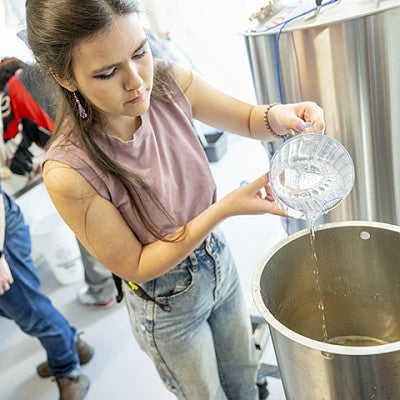Frequently Asked Questions
about the Brewing Innovation Minor
Q: Do I have to be over 21 to participate in the minor?
A: No. The state of Oregon allows students who are 18 years or older to participate, including tasting beers, in our courses. We expect all participants in the program to act responsibly and adhere to all course policies.

Q: Do I need previous experience with beer or brewing?
A: No. Through the courses in the minor, we will help you develop your abilities to taste and evaluate beers and learn basic and advanced brewing techniques.
Q: Who is eligible?
A: Any student who has completed at least one academic year at university and has a minimum of four academic terms remaining until degree completion (the course sequence runs from Spring of one year through Spring of the following academic year).
Q: How does the selection process work?
A: There will be an application process each year.
Q: How do I apply?
A: To indicate your interest in the minor, complete the general interest form, and attend an info session or contact the BRIN advisor at brewinginnovation@uoregon.edu.
Q: What obligations will I have outside the scheduled class sessions?
A: The brewing process takes longer than can be accommodated in a two-hour class. Thus, for each course there is at least one brew session (three sessions for BRIN 322) conducted on Friday that is about five hours long. Students that have conflicts will need to make arrangements to resolve those conflicts so that they can participate in the brew sessions. Brew Days are an essential part of the minor, and attendance is both expected and required. Dates and times for the brew sessions are posted on the courses page. In addition to the brew days, there will be open lab periods throughout the week where you will need to prepare materials and/or check the progress of your fermentations. We will work with you to schedule open labs that accommodate your schedules.
Q: Can I take BRIN 221 if I can’t/won’t complete the minor?
A: We are hoping to offer a stand-alone course option in future years.
Q: What is the lab capacity? Course capacity?
A: All brewing activities will take place in the Fermentation Innovation Lab. Given the hands-on nature of the brewing intensive courses, and the limitations inherent to the brewing equipment, enrollment will be limited.
Q: What’s the deal with electives?
A: The intention of the minor is that you can use two courses that you normally take as part of your major to complete the elective requirements for the minor. Students will choose from a curated list of elective courses. With a few exceptions, you won’t have the prerequisites or access to some of these courses that are outside your major. You should plan to use courses within your major as electives. If you have questions or concerns about electives, please discuss those with the BRIN advisor (BrewingInnovation@uoregon.edu).
Q: Will the minor include other fermentable things, along with beer and brewing?
A: The focus is on beer and brewing in part because the relatively short timeframe for brewing (as little as two to three weeks) and the nearly infinite variations that are possible through choice of ingredients and recipe make brewing a unique innovation platform. That being said, inspiration for brewing comes from many sources: food, wine, and coffee to name a few.
Q: Will this minor prepare me for a role in the brewing industry?
A: Maybe, but perhaps not how you think it will. Of course, you will learn advanced brewing techniques and how to innovate in this space. As a result, you may be in a position to contribute to the brewing industry by bringing creative new ideas to the industry; however, our goal is not to make you a professional brewer, but help you hone your skills as an innovator through the lens of beer and brewing. If your goal is to become a professional brewer, there may be other programs that are a better fit to help you achieve that goal.
Q: Why did the Knight Campus develop this minor?
A: A primary goal of the Knight Campus is to advance innovation training and the translation of new ideas to society. We believe that innovation training is best done in a context: Beer and brewing provide such a context. Brewing is arguably one of humanity’s oldest forms of innovation, dating back at least 13,000 years, and remains one of the most innovative industries today. The courses within the minor will help students develop innovation skills that are transferrable to a variety of contexts in addition to brewing.
Q: Why should I pursue this minor?
A: This minor aims to bring together students from a variety of disciplinary backgrounds in a multidisciplinary context for innovation. It will provide students an awesome opportunity to apply their expertise in science, communication, history, entrepreneurship, and design within an applied context in partnership with students from other disciplines. What you learn about innovation, for example, the practice of design thinking will be applicable throughout your life and career.
